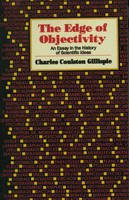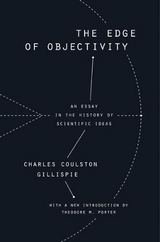
Edge of Objectivity
An Essay in the History of Scientific Ideas
Seiten
1966
Princeton University Press (Verlag)
978-0-691-02350-2 (ISBN)
Princeton University Press (Verlag)
978-0-691-02350-2 (ISBN)
- Titel erscheint in neuer Auflage
- Artikel merken
Zu diesem Artikel existiert eine Nachauflage
Focusing on the social context of science rather than its internal dynamics, this book views science more as a threatening instance of power than as an accumulation of knowledge. It provides an account of the development of scientific ideas.
From Galileo's analysis of motion to the theories of evolution and relativity, Charles Gillispie takes us on a masterly tour of the world of scientific ideas. The history of modern science is portrayed here as the development of objectivity through the study of nature. In the mid-1950s, a young professor at Princeton named Charles Gillispie began teaching Humanities 304, one of the first undergraduate courses offered anywhere in the world on the history of science. From start to finish--Galileo to Einstein--Gillispie introduced the students to the key ideas and individuals in science. The Edge of Objectivity arose out of this course. It must have been a lively class. The Edge of Objectivity is pointed, opinionated, and selective. Even at six hundred pages, the book is, as the title suggests, an essay. Gillispie is unafraid to rate Mendel higher than Darwin, Maxwell above Faraday. Full of wry turns of phrase, the book effectively captures people and places. And throughout the book, Gillispie pushes an argument.
He views science as the progressive development of more objective, detached, mathematical ways of viewing the world, and he orchestrates his characters and ideas around this theme. In the forty-five years since the publication of The Edge of Objectivity, historians of science have established a full-fledged discipline. They have focused increasingly on the social context of science rather than its internal dynamics, and they have frequently viewed science more as a threatening instance of power than as an accumulation of knowledge. Nevertheless, Gillispie's book remains a sophisticated, fast-moving, idiosyncratic account of the development of scientific ideas over four hundred years, by one of the founding intellects in the history of science.
From Galileo's analysis of motion to the theories of evolution and relativity, Charles Gillispie takes us on a masterly tour of the world of scientific ideas. The history of modern science is portrayed here as the development of objectivity through the study of nature. In the mid-1950s, a young professor at Princeton named Charles Gillispie began teaching Humanities 304, one of the first undergraduate courses offered anywhere in the world on the history of science. From start to finish--Galileo to Einstein--Gillispie introduced the students to the key ideas and individuals in science. The Edge of Objectivity arose out of this course. It must have been a lively class. The Edge of Objectivity is pointed, opinionated, and selective. Even at six hundred pages, the book is, as the title suggests, an essay. Gillispie is unafraid to rate Mendel higher than Darwin, Maxwell above Faraday. Full of wry turns of phrase, the book effectively captures people and places. And throughout the book, Gillispie pushes an argument.
He views science as the progressive development of more objective, detached, mathematical ways of viewing the world, and he orchestrates his characters and ideas around this theme. In the forty-five years since the publication of The Edge of Objectivity, historians of science have established a full-fledged discipline. They have focused increasingly on the social context of science rather than its internal dynamics, and they have frequently viewed science more as a threatening instance of power than as an accumulation of knowledge. Nevertheless, Gillispie's book remains a sophisticated, fast-moving, idiosyncratic account of the development of scientific ideas over four hundred years, by one of the founding intellects in the history of science.
| Erscheint lt. Verlag | 21.11.1966 |
|---|---|
| Verlagsort | New Jersey |
| Sprache | englisch |
| Maße | 127 x 203 mm |
| Gewicht | 624 g |
| Themenwelt | Naturwissenschaften |
| ISBN-10 | 0-691-02350-6 / 0691023506 |
| ISBN-13 | 978-0-691-02350-2 / 9780691023502 |
| Zustand | Neuware |
| Haben Sie eine Frage zum Produkt? |
Mehr entdecken
aus dem Bereich
aus dem Bereich
Eine kurze Geschichte | Über die Regeln unseres Lebens
Buch | Hardcover (2023)
Suhrkamp (Verlag)
34,00 €
Bedeutung, Anwendung und Interpretation von Symbolen aus der …
Buch | Hardcover (2024)
Librero (Verlag)
14,95 €



